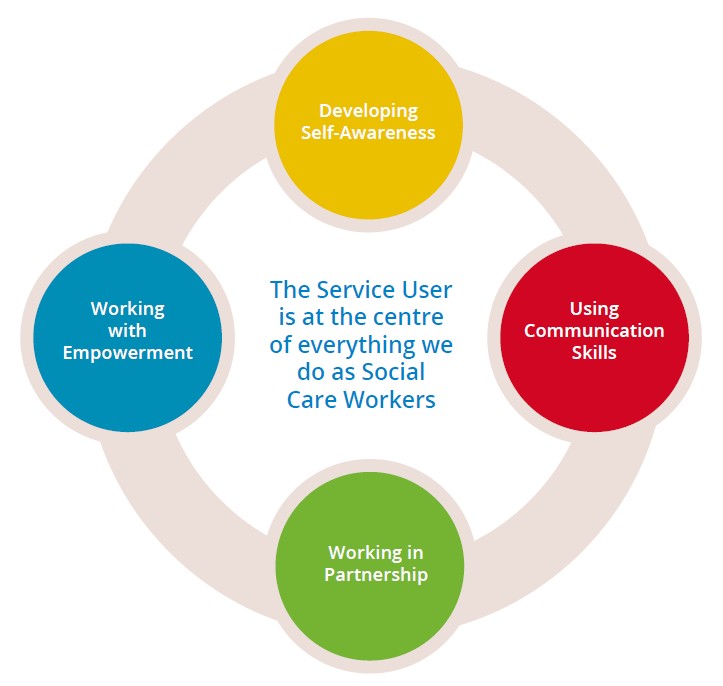Chapter 74 – Victoria Mc Donagh (D5SOP13)
Domain 5 Standard of Proficiency 13
Be able to integrate self-awareness, communication, working in partnership and professional judgement into professional practice to meet the need of the service user and empower them to meet their full potential.
|
KEYTERMS Empowerment Partnership advocacy Relationship building Self-awareness Reflection Professional judgement Supervision
|
Social care is … about supporting people who need different supports at different stages of their lives. As a social care worker, I feel it is about being a guide to an individual who is the expert in their own lives, ensuring they are making informed choices and engaging in opportunities for their own wellbeing. As a service user once explained to me during our time together, ‘You were the angel on my shoulder, helping me to guide my own life.’ |
Empowerment and Partnership in Social Care Work
In social care work there are many different settings and many different people a social care worker might work with. However, regardless of the setting or the service user in front of you, a social care worker should always work from a place of empowerment and partnership with the service user/s. Partnership and empowerment are two key concepts in social care, whatever setting you are working in. Partnership is about working with the person. Whether the service user is a child, an adult with a disability or an elderly adult, you work alongside that individual. The social care worker should be able to act as a guide and facilitate individuals to make informed choices, being experts in their own lives and their own support needs. This is what working in partnership looks in like in practice. In this instance the role of the social care worker is to listen and learn the story and journey of the service user/s. Then the social care worker works alongside them, provides support and encouragement to make positive decisions and choices in their own lives. Working from a partnership approach ensures that the service user is at the centre of the work.
This links with the concept of empowerment. In social care work we talk about the service user being the experts in their lives. When we work in partnership with them we can help them to achieve their goals and meet their individual needs. If as a social care worker we work from this perspective, this empowers the service user to be the leader in their story and situation. The social care worker is encouraging and trusting the service user to take control over their lives, promoting choice and decision-making. This is a powerful tool. Empowering someone can encourage that person to feel supported but also to continue on their journey. In particular, in social care work, when we talk about promoting and encouraging change, the best and most long-lasting change comes from within that individual person. This is empowerment. Empowering a person to make change to contribute to their lives in a positive manner can be the most important step in supporting a service user.
Consider This
In my early years of practice, fresh from my studies and working in the area of adults with a disability, a colleague explained to me that sometimes as staff and in the daily support needs of the service users, we can get busy and might want to hurry things along. That it could be quicker for us to make the service user a cup of tea instead of supporting them to make it for themselves. This colleague explained to me how this was the opposite of empowerment and partnership. That making this cup of tea could, for the service user, be the mountain they chose to climb; and what a difference it could make to them when they are supported to achievethis. While making a cup of tea for one person might be part of everyday living, almost second nature, to another person it could represent independence and progress. When I hear the words ‘partnership’ and ‘encouragement’, they still remind me of that time and how important those concepts are in social care work.
Self-Awareness and Communication in Social Care Work
As described above, the social care worker should be able to act as a guide and facilitate individuals to make informed choices, being experts in their own lives and their own support needs. This represents the concepts of partnership and empowerment in social care. How a social care worker works within this aspect of practice can be both rewarding and also present challenges in practice. Challenges may arise from the service user and their actions and behaviours; but it can also arise from the skills and abilities of the social care worker. A social care worker’s self-awareness, communication skills and professional judgement are important elements here. Professional judgement is our education, training, knowledge and skills all used together in practice to make decisions and judgements about our work every day when working with service users. Therefore, it is extremely important for any social care worker to continuously work on their self-awareness and communication skills, to be able to work in partnership with service users, but to also to have an awareness of their own judgements, values and attitudes that could present as potential barriers to their practice.
I have worked with children from as young as three up to adults in their elderly years. While each individual had different needs at different stages of their lives, I always strived to work ‘with’ them. Working with the person includes working in partnership and putting them at the centre of their support and care. This approach also includes being able to adapt and put aside the time needed to build a relationship. Sometimes it may take longer, depending on the complexity of need and the situation of each person. However, I found when I took this approach that it helped to build a genuine and trusting relationship. Working in social care is also about creating this support as part of a team. How social care workers interact and communicate with each other can also impact upon their relationship and work with the service user/s.
TASK 1
Reflect on how two workers, for example, may communicate to one another in the presence of service users.
Is the language that both workers use appropriate, not only to the setting but to that particular service user?
Does this language reflect the needs of the service user but also respect and empower them?
Does the service user understand the language being used? Do the workers check in with them, using the service user’s language of how they describe their needs and story?
This can be a powerful tool in social care work, when striving to build a relationship and empower a service user. For example, think about a service user sitting in a case conference about their support needs and care. Imagine if that individual did not understand what was being said about them and their disability because the language being used was not their language. That they do not understand, but they are too frightened to say otherwise. This is an isolating place for a service user, a disempowering place. A social care worker must check in with the service user that they understand, but also is their voice and view truly being heard and represented. This is working in partnership and working from a place of empowerment.
TASK 2
Think for a moment about your own communication style. Do you really listen?
Do you adapt your communication style when needed?
Developing skills such as self-awareness is not about being tough on yourself; it is about developing the ability to reflect on your practice. Examine your own values, beliefs and attitudes and their interaction with your practice. Being honest with yourself, do you let any of your own attitudes, values or beliefs get in the way in working with service users? How do you use these values, attitudes and beliefs in a positive way to enhance your practice? This is not about being a negative cheerleader for your work – it is the opposite. It is a healthy process in a safe and comfortable environment for social care workers to check in with themselves. Within the practice setting it may be about using formal supervision to engage in this process, or having an informal discussion with a colleague. Developing your own self-awareness is about seeking out a time and place where you can do this. Spending time developing your self-awareness will enhance your skills and abilities to work in partnership with and empower service users.
The concepts of partnership, empowerment, communication and self-awareness are connected with each other in social care work. It is important to work on each of these in order to truly work with the service user/s and their support needs. This is represented in the diagram below.

The Social Care Worker’s Toolkit
It was once explained to me that social care workers carry with them their own toolkit, just as a mechanic would carry a toolkit. Our tools are the skills, abilities, values, attitudes and professional knowledge required for practice. Just as a mechanic would look after their tools, social care workers need to do the same. Doing this not only contributes to good practice with service user/s, it also develops and maintains the wellbeing of the worker. When a social care worker is looking after themselves in this way, it heightens their self-awareness, develops their communication skills and makes a positive contribution to their role in a social care team (Sanderson & Lepkowsky 2014).
- What is in your toolkit? Can you identify some skills, knowledge, attitudes and values that you use in your own practice?
- Why are these particular tools important to you?
- How well do you care for your tools? How well do you look after your own wellbeing? Are there any areas you would like to improve upon?
This may also be used in supervision with a social care worker or student.
The social care worker’s toolkit requires continual care. This is the work achieved through reflective practice, supervision and continued personal and professional development opportunities.
A Helpful Resource
This five-minute video looks at person-centred care in social care work and the impact of partnership and empowerment for service users: https://www.scie.org.uk/providing-care/personalised-and-person-centred-care/
Summary
This particular proficiency examines how you work in partnership and empower those you work with in social care. It goes further, exploring what skills and abilities are required by a social care worker in order to achieve this. It explores the social care worker’s sense of self-awareness, their communication skills and how they use their professional knowledge to achieve this. This proficiency is explored by looking at how social care workers can strive to work in partnership and empower service users to reach their full potential. All those you work with in social care have unique needs and lives and this must be at the centre of everything you do.
![]() Tips for Practice Educators
Tips for Practice Educators
This reflective activity may assist both placement supervisors and social care educators to explore this proficiency with students. Within the classroom it may be appropriate for students to explore these questions in small groups.
- Can you think of a time where you felt empowered?
- Can you reflect on how you felt and what thoughts you had at the time?
- What made you feel empowered? For example, was it something somebody said or someone’s actions?
- Why does this feel important for you? Or why does this particular experience stand out?
This task can help to develop self-awareness and empathy for the social care worker/student. It can also be used in a supervision session, where appropriate.
References
Sanderson, H. and Lepkowsky, M.B. (2014) ‘Person-centred teams: A practical guide to delivering personalisation through effective team work’, European Journal for Person Centered Healthcare 3(3), doi: http://dx.doi.org/10.5750/ejpch.v3i3.897.
Image Credit: St Patrick’s Mental Health Services. Available at <https://www.stpatricks.ie> [accessed 28 May 2020].

